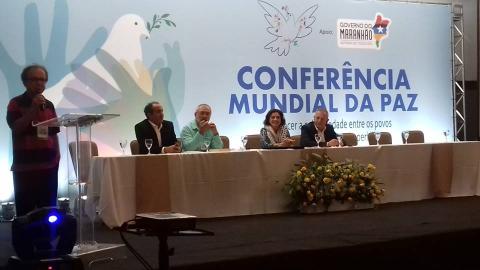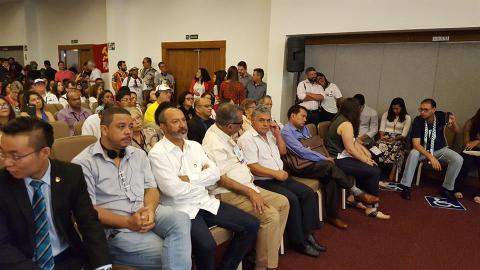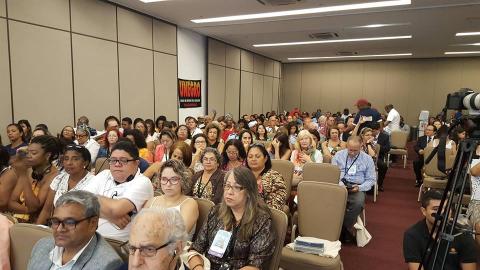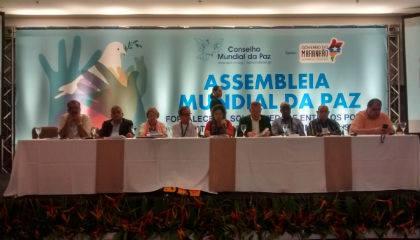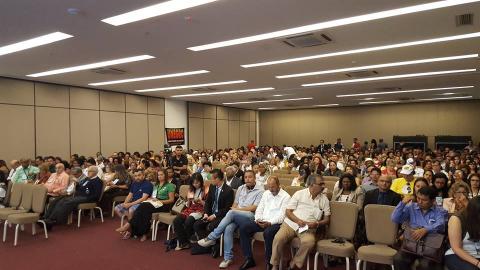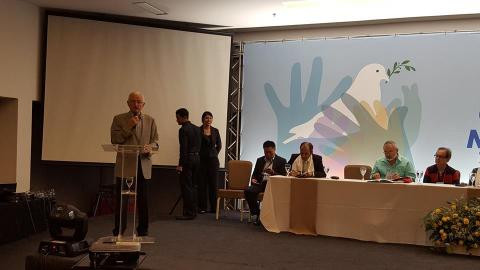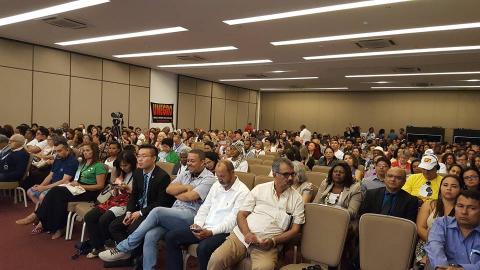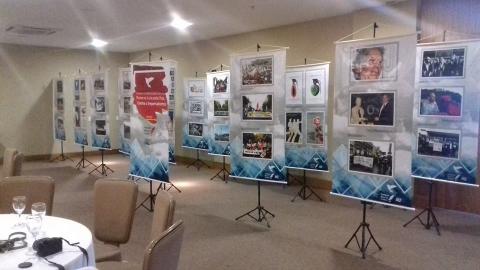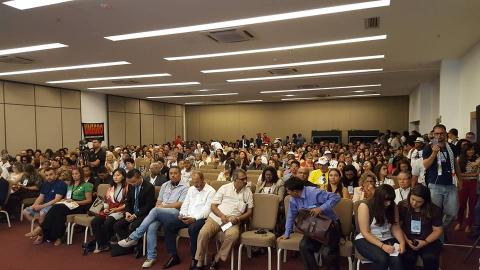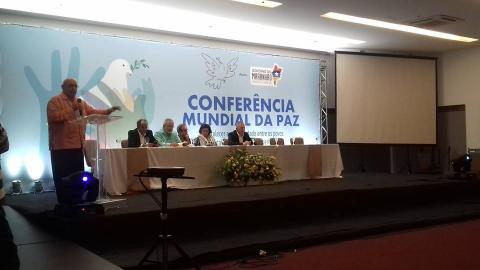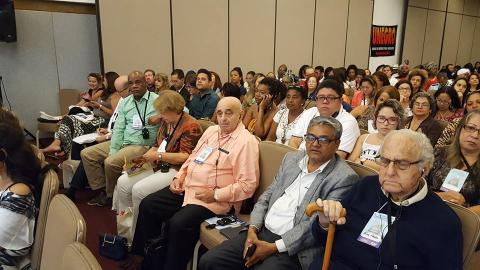WPC Assembly Political Declaration
“Strengthen the peoples' solidarity in the struggle for peace, against imperialism”
World Peace Assembly 2016 – Final Declaration
The 2016 Assembly of the World Peace Council held from November 18-19 in São Luís and hosted by the Brazilian Center for Solidarity of the Peoples and Struggle for Peace (CEBRAPAZ) concluded with the adoption of the following documents.
Introduction
1. The World Peace Council honorably holds its 2016 Assembly in Latin American territory. Following the parliamentary, judicial and media coup d'Etat against the will of the Brazilian people, we affirm our solidarity with the people as they resist the anti-democratic and anti-people attacks from the coup forces.
2. In a period of deep economic crisis, the world is facing new dangers and threats to peace, including ongoing imperialist military interventions against sovereign countries and the revival of Fascism in old and new forms. Humanity is facing the dangers of a generalized war of global dimensions. However, this is also a time for hope, based on the struggles of the peace-loving peoples of the world, that this eventuality can be stopped. We need to recall lessons from historical struggles, and unite all consequent and broad forces for peace and progress in a strong mobilization whose strength, breadth and conviction can prevent new tragedies from occurring.
3. The four-year period since the last Assembly in Nepal has been rich with activity and struggle. The WPC and its member organizations in the various continents have participated in street actions, seminars, debates, congresses and regional meetings. These were intense moments for reflection, sharing opinions and experiences, in which we firmly held the flag of peace. Through clear analysis of the main threats to peace, and by proposing clear tactics and strong bases of unity, we helped strengthen the broad movement for the noblest of humanity’s ideals. In the process, we have strengthened our convictions, our hope and our confidence in the peoples’ will to move forward and achieve another world order, where peace, sovereignty, democracy and social justice will triumph. This recent period confirms that our anti-imperialist analysis, expressed with a commitment to building principled unity in action among the broad peace and progressive forces, is the correct approach to strengthening and developing an effective and broad movement for peace.
4. During this same period, three important and historical anniversaries were marked. In August 2014, we marked the centenary of the beginning of World War I; in September that same year we marked the 75th anniversary of the beginning of World War II; and in May 2015 we celebrated the 70th anniversary of the peoples’ triumph over Nazi-Fascism and Japanese militarism.
5. In this period the WPC reaffirmed its ongoing commitment to strengthening the international mobilization for peace, as an international peace organization struggling for peace and against the root causes for imperialist wars and exploitation.
Threats to Peace
6. The great, democratic and social achievements of the post-war period – including decolonization and national independence; social, economic and cultural development; and the expansion of the international rule of law in areas like peace and sovereignty – have all been systematically and aggressively weakened since the 1990s. In this period, imperialism has increased its drive to impose and maintain dominant positions in the world.
7. Since the last WPC Assembly, we have witnessed the implementation of a policy of hegemony and of imperialism: the ongoing destruction of Libya and its transformation into different protectorates serving the Western powers and their regional allies; the intervention in Syria, with the goal of overturning the legitimate government; the continuation of the policy of occupation, colonization, ethnic cleansing and terrorism by the State of Israel against the Palestinian people, with the open support of US imperialism and EU complicity; and the creation and promotion, by US imperialism and its allies in the region, of violent forces like “Islamic State”, who are assets in the imperialist plan for destabilization and fragmentation.
8. The threats to peace have also included a coup with a Fascist character in Ukraine, with the support of the US, EU and NATO powers; the implementation of the United States' “Pivot to Asia” military strategy that targets Asia, including China; increased global military spending and militarization of the planet and the space; new developments in nuclear weapons technology, which has increased their threat levels; and intensified interventions, including coups, to halt and reverse the democratic, sovereign economic and social achievements in many areas in Latin America.
9. The United States' doctrine of “full-spectrum dominance” defines its global orientation and combines dismantling sovereign countries in the Middle East, confronting the expansion of the emerging economy of China, and promoting a non-conventional war against Russia. The latter tactic is part of the fierce competition and creates a comprehensive “wall of containment” against Russia that extends through the Balkans and Eurasia. It is an action led by NATO and the EU, which has been broadening its bellicose machine and seeking the incorporation of countries of the ex-USSR. The most relevant, recent episode directly involving Europe is Ukraine’s destabilization through a Fascist coup d’État. At the same time, an aggressive response to this doctrine will deteriorate the situation and further increase tensions.
10. The escalation of wars of aggression against sovereign states and the terrorist networks in the Middle East, Africa and Asia have shown that the threats to humankind are even bigger. The organizations and terrorist groups that US imperialism and its allies have helped create and to which they gave resources and weapons are sowing violence against the peoples in the Middle East and are instrumentalized to promote a “security trend” that violates and disregards fundamental rights, guarantees and freedoms in many countries, as the last two years’ terrorist attacks have shown.
11. In its efforts to assert its hegemony, including through imposed regime change, imperialism is making increasing use of highly concentrated corporate media, both at the national and global levels. This undermines the peoples' ability to access and exchange information and analysis. It is a dangerous form of ideological attack and control by imperialism.
12. However, the world situation is characterized not only by threats to peace, but also by the growing current for a world of peace and justice. As we have witnessed, peoples’ movements in different parts of the world are taking ever more important roles in the defense of peoples' rights and sovereignty. At the same time, there are governmental moves, such as the Non Alignment Movement and other regional fora, including CELAC, against any actions of hegemony and for the peaceful solution of conflicts based on the international laws and the UN Charter, and for a world without nuclear weapons.
Economic and Social Crisis
13. As an organization and movement struggling for a cause that concerns all of humanity, we feel connected to the hardships affecting the majorities of deprived and oppressed all over the world by an unequal socio-economic system. The current threats of war are directly related to the wide range of crises affecting the world. The dominant economic system shows its exploitative and oppressive nature ever more, in the contradictions between those owning capital and the dispossessed. In addition to economic and financial aspects, the systemic crisis also affects energy resources, food and the environment.
14. As the exploitation of workers and peoples intensifies, the liquidation of the workers’ rights is extended and policies of public spending cuts result in the deterioration of education, health and other investments that are essential for the social well-being. The crisis deepens the social polarization and inequalities in the redistribution of wealth and reveals itself as particularly destructive.
15. While the all-around crisis is escalating and the peoples struggle for their rights, for development and progress, for the environment’s protection, the end of poverty and hunger and a fair world, the US-EU-NATO continue to be committed to militarist policies of preparation for war. In 2015, according to a report of the Stockholm International Peace Research Institute (SIPRI), 2.3% of the world’s GDP was spent in the military sector, indicating a return to the tendency of rising expenditure that had previously been briefly interrupted. In other words: in 2015, the world spent US$ 1.7 trillion in this sector. The US was the single highest spender, at US$ 595 billion, with more than double that of the second highest spender, China, which spent US$ 215 billion. NATO countries account for over 50% of total global military expenditures.
16. The threats to world peace and to the peoples’ rights are directly linked to the increasing political and economic power of international finance capital and the huge transnational corporations, and the concentration of political and economic world power in the hands of large imperialist powers. The most recent expressions of this phenomenon are the Trans-Pacific Partnership (TPP) which represents a qualitative leap in this concentration process, the Canada-European Union Comprehensive Economic and Trade Agreement (CETA), and the Transatlantic Trade and Investment Partnership (TTIP) which is being negotiated and is the “economic NATO”. In parallel, significant tensions in the world order are happening, with the decay of certain powers and the emergence of new articulations among countries, leading to changes in the correlation of forces. Struggling for peace, we are not indifferent to these processes.
17. In this context, while the US-EU-NATO generally collaborate and maintain their dominance in the framework of the capitalist globalization, new spaces of integration and multilateral cooperation have emerged with differentiated objectives, characteristics and fields of action. These include the Community of Latin-American and Caribbean States (CELAC), the Common Market of the South (MERCOSUR), and the Bolivarian Alliance for the Peoples of Our America – People’s Trade Agreement (ALBA). These phenomena are expressions of the current geopolitical and economic contradictions.
18. New contradictions among the main imperialist states and the “emerging economies” are expressed in the development of new economic formations like the BRICS group (Brazil, Russia, India, China, South Africa).
Regional Scenarios
19. Europe was one of the regions most affected by the economic and financial crisis that appeared in 2007-2008. The EU, as a supra-national political and military structure -- dominated by the great powers, especially Germany -- imposed along with its governments a brutal offensive against social rights and national sovereignty, a process that led to national ruin in many countries. The impoverishment of broad masses, the dismantling of social rights and achievements and the growing unemployment, which have been promoted by EU and national government policies, are accompanied by the huge profits of the big capital and monopolies. The efforts for peace are tied with the solidarity with the peoples of Europe struggle for building another Europe of peace, cooperation, progress and social justice, where the peoples will be the masters of their wealth and of their fortunes.
20. In the past few years the great powers’ bellicose and imperialist policies have intensified, especially by the US and the EU, against countries like Syria, Afghanistan, Iraq, Libya, Yemen and other Middle Eastern nations, with the goal of reconfiguring the region according to the hegemonic interests. The permanent aggressiveness of the Israeli government against the Palestinian people is still key to this strategy of dominance, an obstacle to peace in the region, as well as the US massive military presence.
21. For over 42 years, 37% of Cyprus territory has been under illegal Turkish occupation, in violation of UN resolutions. The WPC reaffirms its solidarity with the Cypriot people in their struggle for a just, viable and sustainable solution for Greek- Cypriots, Turkish-Cypriots, Armenians, Maronites and Latins, with the withdrawal of all occupation forces, all military bases and forces. The WPC supports the effort for a reunited Cyprus and people, land and economy, in a bi-zonal and bi-communal federation with one sovereignty, one citizenship and one international personality, as is provided for in UN resolutions and high level agreements – a Cyprus free from custodians and guardians.
22. The crisis in Syria is a key arena for imperialist aggression in the current context. For five years, the country has been systematically attacked by terrorist militias – overwhelmingly made up of foreign mercenaries – who have been recruited, armed and trained by governments in the West, Israel and reactionary Arab states, by countries that violate Syria’s sovereignty and territorial integrity, such as the US and Turkey. Behind all this is the aim to control energy resources and roads, markets and spheres of influence. The result is millions of victims and material losses that cannot be measured. There are forces involved who are dedicated to finding a political solution, as well as aggressive forces whose aim is the country’s fragmentation for the formation of new influence zones.
23. The millions of refugees and migrants from Syria, Iraq, Afghanistan, Libya and other African countries are the result of the imperialist policies and wars, of which these people are victims of. The same forces causing the wars are showing their hypocritical concern about the consequences by applying the Schengen and Dublin agreements. The WPC strongly denounces the EU-Turkey deal about the refugees, which is in violation of the Geneva Convention and international law on refugees more generally. We demand the right for refugees to go to the destination of their choice.
24. Israel’s aggressive and imperialist policy in Palestine is continuing through the siege of the Palestinian Gaza Strip, the expansion of settlements, the theft of lands, and apartheid-like policies. The WPC reiterates its solidarity with the Palestinian people’s heroic struggle against the Israeli occupation and genocidal policy, which subjugates them to a cruel form of colonialism. We defend the Palestinian people’s sovereign right to constituting their independent and sovereign state, within the borders prior to the 1967 war, with its capital in East Jerusalem and the refugees’ right to return, according to the United Nations’ Resolution 194. We demand the dismantlement of all Israeli settlements in the occupied Palestinian territory and the demolition of the separation wall, as well as the liberation of the seven thousand Palestinian political prisoners in Israeli prisons -- including over 300 children. We call for the recognition of the Palestinian state as a full member of the UN and for the governments of the UN member countries to urgently recognize the State of Palestine. The WPC supports boycott and divestment actions against Israeli settlement products, as a way to increase pressure on the Israeli government.
25. The African continent is a target of the big powers’ neocolonialist and aggressive actions, as demonstrated by the destruction of the Libyan state. Besides France’s military presence in about 10 countries in the continent (including, but not only, in UN operations), US troops are also transforming it in their experimentation lab. The presence of the US Africa Command (AFRICOM), the military drills and the installment of military bases in cooperation often with the EU and NATO, reveal that the African continent is also a target of this power’s and its allies’ warmongering policies.
26. The US maintains a military presence in Egypt and in the Horn of Africa at its base in Djibouti, and is fueling the border dispute between Eritrea and Ethiopia. Increasingly, imperialism is using the pretext of “peacekeeping missions” to justify and carry out its aggressions and occupations against the peoples of Africa.
27. The occupation of Western Sahara by Morocco is a flagrant example of injustice, national oppression and violation of International Law. It is an abhorrent expression of colonialism – Western Sahara is the last African colony – contrary to the tendency of the Historical epoch leading to the achievement of national emancipation, independence, self-determination and sovereignty.
28. In 2010, the US Administration announced a “rebalance” that shifts global military priority to the Asia-Pacific region. This includes deploying 60% of US naval forces to the Pacific and intensifying political and diplomatic activity aiming to establish a greater presence and hegemony in the region.
29. US-Japan military cooperation was radically developed with a “war law” that enables Japan to exercise a right to collective self-defense with the US. We salute the Japanese people in their struggle against US military bases in the country, including Okinawa, and against the government's plans for Japan's re-militarization.
30. The joint military maneuvers by the US and its allies, and the recently deployed THAAD (Terminal High Altitude Area Defense missile) in South Korea, escalate tensions with China and with the Democratic People’s Republic of Korea. Continuing US-South Korea’s joint military maneuvers only deteriorates the situation, which should be solved by diplomatic means including through the “Six-Party Talks”.
31. Many people in Vietnam continue to suffer from the effects of Agent Orange, 55 years after its first use in that country. The WPC stands in solidarity with the victims of these chemical attacks, in their struggle for justice and compensation from the US government and the chemical corporations that manufactured Agent Orange.
32. The WPC supports the multilateral, political and peaceful resolution of the territorial disputes in the South China Sea, in accordance with international law based on the UN Convention on the Law of the Seas (UNCLOS 1982). We object to any unilateral action by the involved parties to change the current state of affairs. The WPC denounces US military intervention in these disputes and is opposed to military escalation in the region.
33. South Asia has become a major flashpoint, with relations between India and Pakistan, both nuclear powers, deteriorating to a new low. Cross-border terrorism and frequent breaches of the line of control increase the risk of full armed conflict. The growth of religious fundamentalism and sectarianism further adds to this danger. As part of US imperialism's objective is to create an Asian version of NATO, India has been co-opted through a military and strategic partnership with the US, to share military bases and facilities.
34. US imperialism is developing a strong counter-offensive in Latin America and the Caribbean to depose progressive and leftist governments, as a bridge to control markets and plunder the region’s raw materials. The continental right-wing, subordinated to US imperialism, has intensified its actions aiming to dismantle the social change processes ongoing for almost two decades. Democracy has deepened and broadened in many areas, and a new cycle of economic development, social progress, integration based on solidarity and national sovereignty has begun. This democratic process has provided an effective arena for contributing to peace, and it is of great relevance that the CELAC proclaimed the continent as a “zone of peace”, in its 2014 Summit.
35. We underline the Cuban Revolution’s heroic victory in its battle during over half a century facing the US imperialism’s aggressiveness, with the US recognition of its policy’s defeat against Cuba, and with the start of the process of normalization of relations between both countries. The WPC supports the Cuban people’s struggle for the end of the criminal economic, financial and commercial blockade, which was declared obsolete by the very US Government, and against the illegal occupation of Cuban territory by the US naval base in Guantánamo.
36. The WPC extends our full solidarity to the people of Puerto Rico, in their struggle for independence from the US and for self-determination. The WPC shows solidarity, likewise, with the people of Argentine in their legitimate right to sovereignty over the Malvinas, Georgias and South Sandwich Islands, which are under British control. It is necessary to warn that these islands, like other territories, are frequently turned into the UK’s or the US-NATO system’s military bases.
37. An incontestable victory of the region’s democratic forces was the progress of the peace talks in Colombia, between the Government and FARC-EP, resulting from the people’s heroic struggle. In this progress, a key part is played by the Colombian social movements and communities, with the support and the solidarity coming from other nations, for a political solution with justice and dignity that the people of Colombia can use to strengthen their struggle.
38. In the Latin-American scenario, the struggle in defense of Venezuela’s Bolivarian Revolution is ever more relevant, in the face of the constant threats of destabilization and intervention coming from the local oligarchy, in collusion with the US. We express our solidarity with the Venezuelan anti-imperialist forces and with the Committee of International Solidarity (COSI).
39. We also express our support and solidarity with the Brazilian people and the Brazilian Center for Solidarity with the Peoples and Struggle for Peace (CEBRAPAZ) in their defense of democracy and against the illegitimate government’s attacks on social, economic and political rights, after the coup d’État consolidated in August 2016, overthrowing President Dilma Rousseff, who had been re-elected with the votes of 54.5 million Brazilians in 2014.
40. The WPC supports the end of foreign military presence through MINUSTAH in Haiti and its replacement by civil, humanitarian support. The Haitian people have been determined in their struggle to overcome the repeated natural disasters that have destroyed much of the country’s infrastructure, with international support, and also to consolidate their institutions based on their national sovereignty. The WPC supports the just demands of the Haitian people for the repayment, in current dollars, of the reparations paid to France in “exchange” for Haiti's independence.
41. The World Peace Council expresses its solidarity with the Latin-American and Caribbean peoples in their struggle for a society with justice and freedom. It is a struggle in which the peoples, their political and social organizations, and the governments that defend the peoples’ interests face the most powerful forces in the world.
42. In the Arctic, the circumpolar countries – including the US, Canada, Russia, Sweden, Norway, Finland and Denmark – are participating in an increasing military buildup, which contributes to escalating global tensions. These developments also threaten the fragile and delicate natural environment in the Arctic, as well as the Indigenous communities there.
43. Throughout the world, colonialism and genocide against Indigenous Peoples continue. This is deeply entwined with the drive for more corporate profit, particularly by resource extraction industries, and the imperialist drive to control greater territories. At the same time, an increasing number of struggles around the world for peace, human rights and environmental justice are being initiated and led by Indigenous Peoples. Flowing from our longstanding commitment to anti-colonial struggles, the World Peace Council expresses our deep solidarity with the struggles Indigenous Peoples around the world, for their cultural, national, territorial, political and economic rights.
Militarization and NATO
44. Seeking to assure its dominance over the world, the US maintains 865 military bases in about 130 countries, where it stations 350,000 soldiers equipped with the most sophisticated weaponry, war planes, missiles and war ships. This represents 95% of all foreign military bases in the world, and it includes US bases throughout every continent and region.
45. Besides maintaining military bases across the world, the US seeks to dominate seas and oceans through seven powerful naval fleets and control the outer and the cybernetic space through an infinity of satellites, spy crafts, radar and surveillance stations and communications’ networks.
46. NATO’s extension is also one of the most pressing issues in our agenda. This powerful military organization, under the US domain, gathers 28 member states in North America and Europe and maintains diverse partnerships with dozens of countries in all continents. Since 1991, NATO has expanded in numbers and broadened its framework and area of operations, which reveals its fundamental goal of being a primary tool for the domination of the world. NATO is an enemy of peace and of the peoples. From its founding days in 1949 and as an offensive, military alliance, it is always ready to intervene. NATO’s expansion and provocations are directly responsible for the destabilization, tensions, violence and war.
47. At its Summit in Warsaw in 2016, NATO officially and publicly declared, with the agreement of its member states, that it maintains the right and readiness for a nuclear first-strike.
48. The struggle against NATO is part of the platform on which the peoples and social and political organizations that advocate for peace, social justice and progress mobilize. This includes promoting the struggle of the peoples' and peace movements for NATO’s dissolution and for the struggle of each people within each NATO member state for withdrawal from this criminal alliance. It is one of the World Peace Council’s main struggles.
49. The hegemonic powers still threaten life on the planet with their nuclear weapons and other weapons of mass destruction installed in military bases of the US-NATO system. It is indispensable to promote the struggle for the abolition of these weapons and for an end to the military bases.
50. Abolishing nuclear weapons is more urgent than ever, if we wish to avoid a human catastrophe like the one experimented by the Japanese people in Hiroshima and Nagasaki, 71 years ago, or of bigger proportions. The global stockpile of nuclear warheads is over 13,000, and new developments in nuclear weapons technology and delivery mechanisms are driving proliferation. The very survival of humanity is threatened. 1,800 of them is still on High-Alert, is a threat to the very survival of humanity.
51. One of the most important recent events in the opposition to this trend was the adaption of a UN General Assembly resolution titled “Taking Forward Multilateral Nuclear Disarmament Negotiations” to commence a negotiation on legally binding instruments prohibiting nuclear weapons that would lead to their total elimination. This was a reflection of international public opinion and movements calling a total ban on nuclear weapons as well as governmental efforts by non-nuclear weapon states.
52. On the other hand, the 2015 Non-Proliferation Treaty’s Review Conference resulted in another fiasco, failing to adopt a final document due to the opposition of USA, UK, and Canada. These countries followed the will of Israel, who opposed convening a conference on the Middle East as a zone free from nuclear and other weapons of mass destruction.
A Call for Unity in the Struggle for Peace
53. The World Peace Council concludes its 2016 Assembly in São Luís confident in its growing strength as an anti-imperialist organization that is able to unite broad forces in the struggle for peace and in solidarity with the peoples. This conviction is based on the rich repertoire of activities that the WPC has undertaken and achieved. Since the 2012 Assembly in Nepal, the WPC has promoted and developed campaigns and global actions in all regions of the world, has mobilized social forces against the military interventions in sovereign countries, coups d’État, militarization and nuclear weapons. A detailed overview of these activities is the basis for further strengthening the WPC.
54. The US, NATO and the EU’s great powers and their allies, in their ambition for world domination, are the great threats against peace and the peoples in the whole planet. The world order that the hegemonic powers have been trying to impose on the planet through threats and aggressions cannot be successful.
55. Today, with the existing weapons, a new war of proportions equal to the great world wars that marked the 20th century would mean Humanity’s destruction as we know it. It is urgent to defend principles such as the peoples’ right to self-determination, national sovereignty and independence, non-interference in the states’ domestic affairs, the peaceful solution of international conflicts, the end of all forms of national oppression, disarmament, the dissolution of political-military blocs, the cooperation among the peoples and countries for a new world order of peace, emancipation and for humanity’s progress.
56. Global capitalism's relentless drive for profit results in devastation of the natural environment, through depletion of resources, pollution of the land and water, and global climate change. This indiscriminate destruction ruins the lives of millions of people, displaces millions of people around the world, and threatens the survival of the entire human race. The bulk of the environmental crisis has been caused by the economic activities of the richest countries, who refuse to bear their full share of this responsibility.
57. The peoples have mobilized in defense of their rights and sovereignty. We will not be bound to the imposition of any imperialist agenda of national oppression or exploitation, we will continue to resist and reject its instruments of war and domination, such as NATO, the nuclear weapons and the military bases, fleets and exercises all over the world.
58. Strengthening the WPC is a key task to strengthen solidarity between the peoples. Our alliance and convergence between the movements that are its members and the friendly organizations are essential to promote our unitary struggle for peace, justice, popular and national sovereignty, for common progress and for a world free of occupation, oppression, colonialism, exploitation, imperialism and war. This is what we must continue and will continue to work for.
59. Our time’s spirit is the affirmation of the peoples’ will to take their destinies in their hands. Developing the struggle for peace, democracy and justice is an inexorable tendency. Anything that contradicts this tendency is the manifestation of intolerance and oppression, the imposition of force over right, of the imperialist and military power, of interventionism and war over the peoples’ sovereign will, and it deserves condemnation from all democrats and peace lovers.
60. The World Peace Council is called upon to play an important role in this struggle and in strengthening this trend of progress. Since it was founded, it is an international organization that embraces broad convergence of all struggling against war, nuclear weapons, militarization, imperialism as a whole and the violations of the peoples’ and nations’ rights. We are confident that the 2016 Assembly in São Luís, Brazil, offer us another step and impulse in the walk towards strengthening the WPC and the entire peace movement.
61. It is with these convictions that the delegates to the Assembly in São Luís and the national member organizations of the WPC are determined to formulate resolutions and motions that push forward broad unity in actions for peace, democracy, social justice and solidarity between the peoples. This way, we will strengthen the peoples' solidarity in the struggle for peace, against imperialism!

